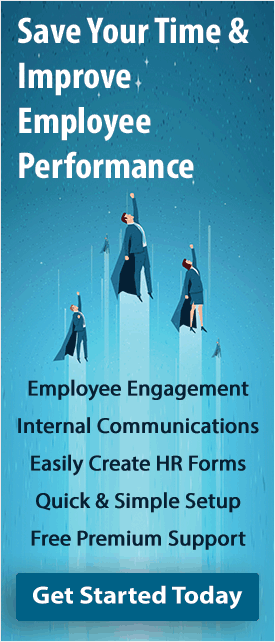If you’re serious about employee engagement, then exit interviews are an essential part of the process. You may well be saying to yourself: Why bother? Who cares what they think, they’re leaving! And while it’s true that they’ve already made the decision to leave, it’s also true that the reasons behind the departing employee’s resignation can provide a wealth of information about how well your company is doing. And so, if you want your business to continue to improve with higher numbers of engaged employees and better staff retention rates, then the exit interview is a must. Let’s find out more about what’s involved.
Exit Interview Forms: The Benefits
We’ve touched on this already and it’s certainly a fact that employees who are leaving the company will provide far more honest feedback than a current employee will ever give. Exit interviews are, therefore, a rich source of data for a whole range of organizational issues including the following:
company culture
- day-to-day concerns
- tools of the trade
- internal communications
- relationships with colleagues and managers
- workplace ethics
- opportunities for professional development or career advancement
- employee morale and team spirit.
And while it’s too late to do anything for that particular employee, the feedback provided across a number of exit interviews will help you to determine any underlying issues or trends that really need to be addressed as an organization. It may be, for example, that increased pay is a common factor. In this case, you may want to review your pay structure to ensure it’s in line with others in the industry so that you can attract and retain the best talent. For other departing employees a noisy work environment might be an issue or it could be poor internal communications and feeling as though they needed more information or support to get the job done. The bottom line is that information is power – once you know what the problem is, you have the opportunity to rectify it.
Conducting exit interviews will, therefore, impact on employee engagement generally and will also help the organization to continuously improve across all areas.
Exit Interview Forms: The Risks

In addition, the departing employee is under no obligation to attend an exit interview. There’s no legal requirement for them to do so. In fact, some employees will simply not show up for the exit interview while others will refuse point blank to attend. And every abortive exit interview is a missed opportunity to gather rich data and valuable insights.
So, how do you encourage employees to attend? Well, often the reason behind the reluctance is a fear of repercussions – whether it’s in relation to concerns over their personal reference letter or not wanting to scupper their prospects of being rehired. And the way around that is to make sure the employee understands you are genuinely seeking their honest views so you can improve how the organization is run. It won’t affect them on a personal level. In fact, you could make participation a condition of being eligible for rehiring!
Exit Interview Forms
As we’ve seen, having a set exit interview form is important to guide the discussion and ensures that you gather information that is useful and relevant for the organization. Following a set format means that you will be collecting consistent data that can be aggregated to provide meaningful and actionable information. Use your company intranet’s forms builder to create a template. Alternatively, use an embedded Google Form to set one up. The advantage of embedding it in the intranet page is that you can provide explanatory notes alongside to guide the process.
It’s a good idea for the interview to be conducted by someone other than the line manager. A neutral third person is more likely to result in the staff member providing frank views and will help to ensure the interview remains constructive. Often it’s the HR department that takes on the responsibility for conducting interviews; however, in small businesses this isn’t always feasible and a manager from another department with no direct relationship with the departing employee can be drafted in. Alternatively, some companies publish the exit interview form on the intranet and allow the staff member to complete it online. In fact, there will be employees that prefer the anonymity and the non-confrontational nature of this approach.

- reasons for leaving
- tools of the trade
- relationships with colleagues and managers
- company culture.
Exit Interview Forms: Sample Questions
Try and keep the questions to a minimum. A departing employee isn’t going to want to invest a huge amount of time running through a long set of questions. What’s more, a lengthy questionnaire will only make the task of analyzing the data that much more complicated. Keeping it short and simple should be your guiding principle. So, to make life easier we’ve come up with the following sample questions to help guide your own exit interview form. The questions are organized under the headings we identified above. Feel free to copy these examples or use them as the basis for developing your own exit interview form.
 Reasons For Leaving
Reasons For Leaving
- What made you look for a new job in the first place?
- Why are you leaving?
- What was the deciding factor that led you to accept the new job?
Tools Of The Trade
- What three things did you like most about your job?
- What three things did you dislike the most?
- Do you feel as though you had the resources and support you needed to get the job done?
Relationships With Colleagues and Managers
- What was your relationship like with your manager?
- Did you have clear goals and know what was expected of you in your job?
- What is your experience of employee morale and team spirit within the company?
Company Culture
- What’s your understanding of the company’s overall goals?
- Do you feel as though you made a contribution to those goals in your job?
- What are your views about management and leadership in the company generally?
During the interview, it’s important to keep things on a constructive level so stick to the exit interview form and don’t get drawn into personal issues or office gossip.
Exit Interview Forms: Processing The Feedback
Every exit interview will have an insight to offer or will identify an opportunity for improvement within the company. It could be an easy fix such as providing a dedicated printer for payroll so that confidential information can be easily printed out. Or it could be a harder fix such as improving internal communications. Either way key points from the meeting should be shared with the employee’s supervisor or departmental managers as appropriate.
In addition, you will need to aggregate the information and provide regular feedback to senior managers on any underlying organizational issues or common themes. That way action can be taken to avoid losing any more employees.
And don’t forget to feedback to the wider employee body on any key issues via the intranet’s news feed. After all, canvassing views, listening to staff and being seen to act on the feedback are all key drivers of employee engagement.
Interested in finding out more about exit interview forms and, in particular, how an intranet can support the process? Then get in touch with the team here at MyHub. Our intranet solutions can streamline the process while also delivering a host of other business benefits. Contact us for a demo or take advantage of our 14-day free trial.


 company culture
company culture






0 Comments